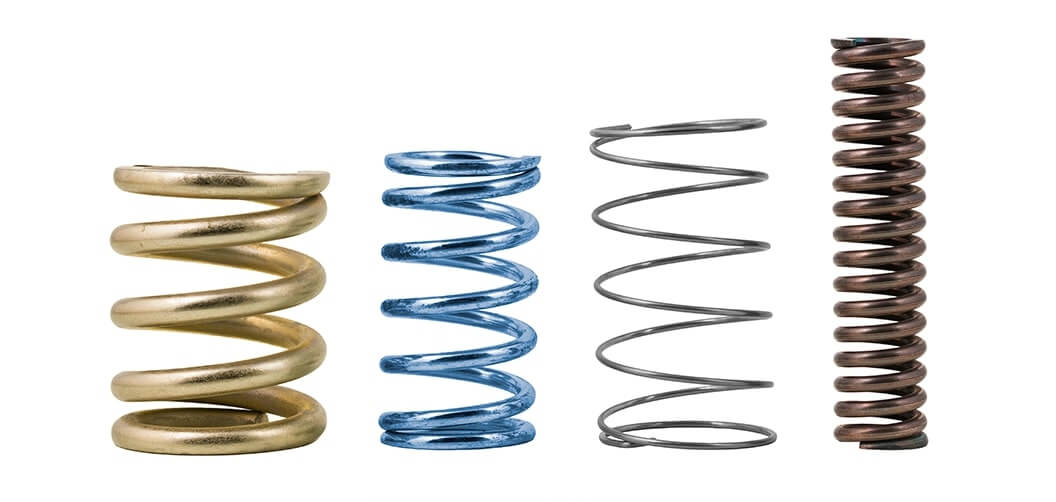
Choosing the correct spring material is one of the most important engineering decisions in any mechanical design. The material determines a spring’s strength, corrosion resistance, temperature capability, fatigue life, electrical conductivity, magnetism, formability, and long-term stability. A spring may have the ideal dimensions and design, but if the wire material is not suited for its environment or load conditions, performance will suffer and premature failure becomes likely. This guide provides engineers with a clear, practical understanding of the most common spring materials, how they behave, and how to match each material type to the requirements of a custom spring application.
Spring materials are chosen based on the environment, required cycle life, operating stress, temperature range, and the type of spring being manufactured. The wrong material may corrode, weaken, fatigue prematurely, or lose its mechanical properties under certain conditions. When designing a custom compression, extension, torsion spring, or wire form, engineers must consider not just the initial performance but how the material will behave over time. Different applications require different combinations of strength, elasticity, corrosion resistance, and stability. Understanding wire characteristics ensures the spring will deliver consistent performance throughout its service life.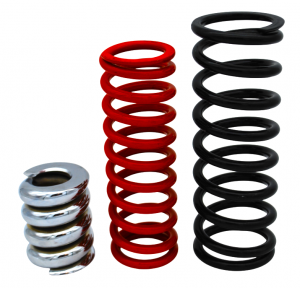
Music wire is one of the most widely used spring materials because it offers exceptional strength and fatigue life at a competitive cost. It is ideal for applications requiring high tensile strength and excellent load-bearing capability. However, music wire has limitations: it is not suitable for elevated temperatures and is vulnerable to corrosion unless properly coated. Engineers typically select music wire for indoor mechanical components, precision instruments, or controlled environments where humidity and chemicals are not a concern.
Stainless steel is chosen when corrosion resistance is a primary requirement. Grades such as 302 and 316 offer strong resistance to moisture, chemicals, and mild salts, making them suitable for outdoor use, medical devices, food processing equipment, marine environments, and applications where cleanliness and durability are key. While stainless steel is less strong than music wire, its stability and corrosion resistance often make it the superior choice for long-term reliability. Stainless steel also maintains performance across a broad temperature range and is non-magnetic depending on the grade.
Chrome silicon wire is engineered for extreme conditions. It performs exceptionally well under high stress, shock loads, and elevated temperatures. Common applications include firearm components, industrial machinery, suspension systems, and any environment where springs must withstand repeated heavy loads. Chrome silicon maintains its strength and elasticity even when subjected to continuous high-stress cycles. Engineers choose chrome silicon for custom springs that must survive demanding environments without losing performance or experiencing fatigue-related failure.
Chrome vanadium provides excellent strength, ductility, and fatigue resistance, making it suitable for applications with high impact loads or rapid cycling. It performs well in moderate temperatures and offers a balance of toughness and wear resistance. Chrome vanadium is often used for springs in tools, heavy equipment, industrial mechanisms, and other assemblies requiring durability. Its mechanical properties allow springs made from this material to maintain reliability even under dynamic loading conditions.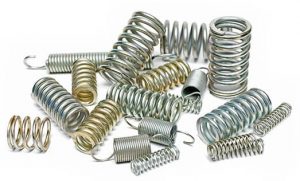
Phosphor bronze is selected when both corrosion resistance and electrical conductivity are required. It also offers excellent formability, making it suitable for intricate wire forms and torsion springs. Engineers often specify phosphor bronze for switches, electrical devices, marine applications, and environments where springs may be exposed to chemicals or moisture. It also provides good fatigue resistance and stability over long service cycles.
Beryllium copper combines high strength, excellent electrical conductivity, and non-magnetic properties. It is commonly used for springs in electronics, aerospace instruments, sensing devices, and environments where magnetic interference must be avoided. Beryllium copper also resists corrosion and maintains consistent performance across a wide temperature range. Engineers rely on it when springs must deliver precision under demanding electrical or environmental conditions.
Inconel and other nickel-based alloys are chosen for the most demanding applications, including aerospace, high-temperature industrial systems, chemical processing equipment, and environments with extreme thermal or corrosive exposure. These materials retain their mechanical properties at temperatures far above the limits of carbon steel or stainless steel. They also offer exceptional corrosion resistance, oxidation resistance, and long fatigue life. Custom springs made from Inconel or similar alloys are used when failure is not an option and performance must remain stable under severe conditions.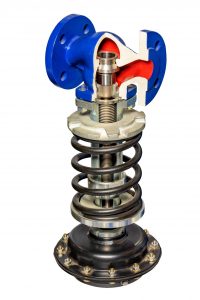
Selecting the correct spring material begins with understanding environmental factors. Temperature, humidity, chemicals, load type, stress cycles, and required service life all influence material choice. Springs exposed to outdoor conditions, moisture, or chemicals require corrosion-resistant alloys like stainless steel or phosphor bronze. Springs operating under high stress or repeated cycling benefit from chrome silicon or chrome vanadium. Applications involving electrical conductivity or non-magnetic requirements may call for phosphor bronze or beryllium copper. High-temperature applications often necessitate Inconel or other advanced alloys.
Each spring type benefits from different material properties. Compression springs often rely on high-strength materials like music wire, chrome silicon, or stainless steel for consistent load performance. Extension springs may require materials with good elasticity and corrosion resistance depending on the environment. Torsion springs benefit from materials optimized for bending stress and fatigue resistance, such as chrome silicon or stainless steel. Wire forms depend heavily on formability and environmental suitability, making stainless steels and copper alloys common choices. Matching the spring type with the correct material ensures optimal performance and longevity.
Material choice directly affects fatigue life, stress handling capability, and long-term stability. Springs operating near their maximum stress level require materials with high tensile strength and fatigue resistance. Springs in corrosive environments require alloys that maintain surface integrity to prevent premature cracking. Temperature extremes can weaken some materials, reducing their ability to return to their original shape. Understanding how each material behaves under load, temperature, and environmental conditions helps engineers design springs that last.
Material selection is only part of the equation. Engineers must also consider manufacturing quality, traceability, and compliance. ISO 9001:2015 certification ensures that materials, processes, and inspection procedures meet strict quality requirements. Traceability ensures that every spring produced comes from verified, consistent wire sources. For firearm or defense-related components, ITAR registration ensures compliance with regulations. Selecting a manufacturer that provides high-quality materials and consistent processing is essential to achieving predictable performance.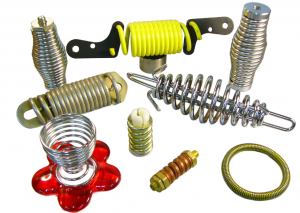
Choosing the correct spring material requires an understanding of mechanical performance, environmental conditions, fatigue characteristics, and manufacturing processes. Stock reference tables may not provide the level of detail required for complex applications. Working with an experienced custom spring manufacturer ensures that material, wire diameter, heat treatment, and design considerations align with real-world operating conditions. Engineering support helps prevent issues such as fatigue failure, corrosion, overload, and dimensional instability.
Material selection is one of the most critical steps in designing reliable custom springs. Each alloy offers different strengths and limitations, and selecting the right one ensures performance, safety, and long-term durability. By understanding how materials behave under different conditions and working with an experienced manufacturer, engineers can create custom springs tailored perfectly to their application.
For assistance selecting the best spring material for your application, contact Ace Wire Spring & Form Co. for design support, prototyping, and custom manufacturing of compression, extension, and torsion springs, as well as custom wire forms.

Copyright © Ace WIre Spring & Form Company, Inc. All Rights Reserved. Pittsburgh Website Design by Higher Images.